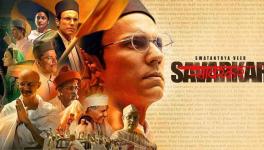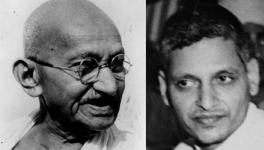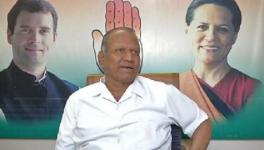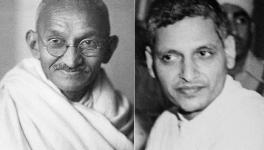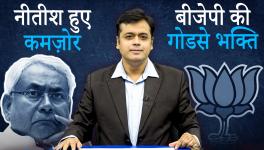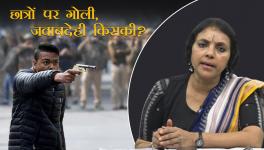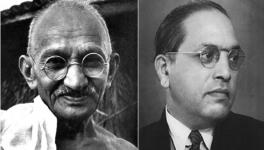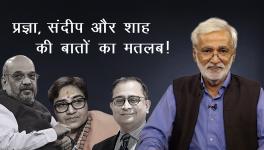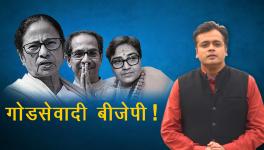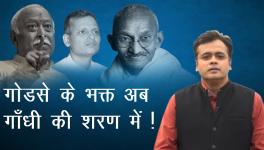Pragya Thakur’s Idea of India Pits Gandhi Against Godse
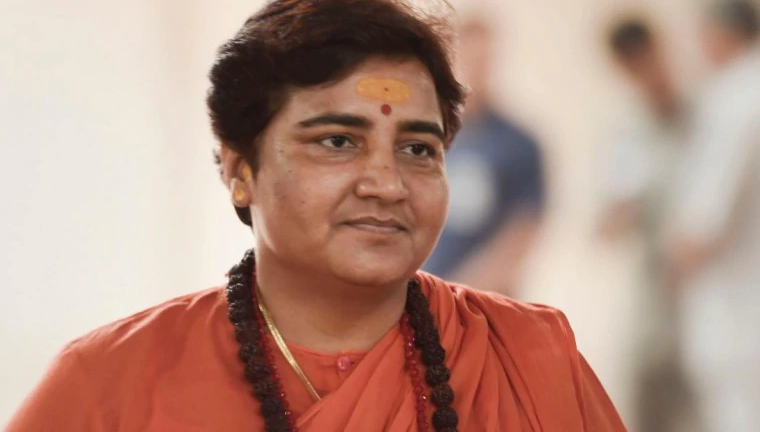
Image Courtesy: PTI
Pragya Thakur has done it again. She has provoked outrage and alarm (allegedly) by interrupting a Member of Parliament and retorting that his condemnation of Nathuram Godse was wrong. He was a true patriot, she has asserted. In the face of Opposition hostility and the Bharatiya Janata Party or BJP’s discomfiture, she now says that she had not mentioned Godse at all. Then there was no need for the apology tendered by her to anyone “if her remarks had hurt his or her sentiments”.
But parliamentary proceedings are recorded electronically And the Speaker need hardly have expunged remarks that were not really made. Thakur has found herself going down the slippery slope not because of some honest mistake but because of a conviction taking shape after decades of indoctrination.
The notion that “after all, Nathuram Godse was a genuine patriot” is staple truth for many people sharing her background. It is no accidental misperception. Once underground, this notion or myth broke surface during the second term of the Atal Bihari Vajpayee government. His brother, imprisoned for involvement in the same crime, had come out of jail and was allowed to say that his “martyred brother” had been a true patriot and even that he still felt no remorse for the act. It all went in the name of free speech and the sacred necessity of “looking at both sides of the coin”. Frontline magazine carried an interview with him without endorsing his views in January 1994 (excerpts).
Godse’s apologia, his lengthy statement before the court, was published and widely circulated as a booklet. A drama, It’s Me, Nathuram Speaking, was staged in Mumbai. There was even a film. All those events could not have been just flukes. They were organised and orchestrated countrywide. Not difficult to guess who did it. And with real memory of Gandhiji fading,
this vigorous propaganda might well have made an impression even on common people without knowledge of those days when an entire nation had been shell-shocked by the news of Gandhiji’s assassination.
Pragya seems to belong not to the ordinary naive public, but the select corps of those who made the propaganda. Or she might have joined that corps when she came of age.
So we do not turn a hair when even on a channel like NDTV we hear some people breezily asserting that “when all is said and done Godse turns out to have been a patriot”. Had these people made such a statement in public even in 1950 or 1951, they would have been beaten into a pulp by enraged crowds.
What exactly is meant when it is said that “Nathuram was a patriot”? There is no reason to doubt that Nathuram believed in what he said in self-defence and that his rancour against Gandhiji had not been “personal”. He had no occasion to come in direct contact or conflict with Gandhiji. But he moved in circles where venom against Gandhiji was common and deep.
For a man like him, the ideological became the personal. And that ideology spat burning hatred on everything Gandhiji stood for at that time. In the years 1946 to 1948 the air was heated with furious debate on the future shape of independent India. Both the Muslim League and the Hindu Mahasabha championed the two-nation theory. While for the Muslim League it unequivocally meant partition of the country on communal lines, the Hindu Mahasabha and the Rashtriya Swayamsevak Sangh (RSS) apparently sought to retain an undivided India. Their prescription for Muslims was that, as “foreigners”, they will remain in India on sufferance, as second-class citizens.
The second RSS chief MS Golwalkar’s book, Bunch of Thoughts, published in 1965, retained enough of that outlook to insist that Muslims must either be Indianised or accept the lot of aliens.
Even the Congress was shaken and divided by the ferocity and scale of Partition riots. The leadership was buffeted by such headwinds and it shakily lurched towards partition. Gandhiji alone stood like a rock against such divisive communal ideas of independent India. He not only went to Noakhali in East Pakistan to prevent Muslim massacre of hapless Hindus but thought it was his bounden duty to protect Muslims in Delhi from mass slaughter incited and led by Hindu extremists and revenge-seekers.
Gandhiji’s historic fast eventually restored peace in the riot-torn capital and compelled even the RSS to commit itself, in writing to spare Muslim lives. This noble act of his rankled in the minds of saffron groups as a heinous act of betrayal of the Hindus and they continued to nurse an undying hatred against him.
Can that be called “patriotic”? It is no longer a matter of semantics. Nor can it be waived away with the plea that patriotism came in all shapes, sorts, sizes and colours. One is forced implacably to face the question: what is this “patria” or country? Is it Gandhi’s India or Godse’s? Our Constitution, as long as it is not undermined, affirms on the whole India as Gandhiji conceived it. And we remain for ever in debt to him for that.
The writer is a commentator on sociopolitical issues and a literary critic. The views are personal.
Get the latest reports & analysis with people's perspective on Protests, movements & deep analytical videos, discussions of the current affairs in your Telegram app. Subscribe to NewsClick's Telegram channel & get Real-Time updates on stories, as they get published on our website.









